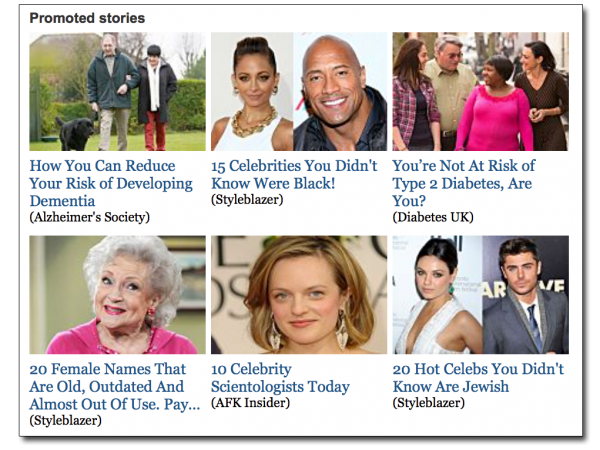One of the tragedies of the accelerated ‘internet time’ is the speed at which advertisers can discover our weaknesses. It took several centuries for tabloid newspapers to evolve their attention-grabbing headlines with minimal content and maximum emotion. FURY AT VICAR’S CELEB SEX ROMPS. (‘Fury’ is a word which seems only to be used now on the front pages of tabloids and local papers.)
Of course, gentle reader, you and I would never buy a paper with that headline. Despite the temptation, we know in the end it will be unsatisfying. It’s journalistic pornography, appealing to our baser instincts. Resisting the lure is part of our education, our self-control. We laugh as we pass by, at the poor, less-intelligent souls who succomb to this ultimately unrewarding titillation.
But, in just a couple of decades, the web has allowed this process to be refined to an extreme degree. Techniques such as A/B testing enable publishers to play with content, delivering version A to one group of 10,000 viewers and version B to another 10,000 to see which delivers the most traffic/sales/ad-clicks. This can be repeated, like an iterative fractional distillation, allowing the drug to be purified as never before.
The web’s equivalent of the tabloid headline is the link text – the thing that stops you walking past and persuades you to look inside. The process can be applied there too, and we see the results everywhere: links which convey even less information and appeal purely on the gut level. “Three old grannies got up on stage and you’ll never believe what they did next!” “10 things no mother should ever do!” “This one weird tip will transform your sex life!” “The most shocking video you’ll ever see!” They are designed, of course, not to convey information, because if you had any at that point, you could decide whether or not to click. Instead, they just tell you that you really must click, because otherwise you’ll be missing out, and we’ll tell you why once you’ve done so. Because, of course, we get paid by our advertisers if you visit our site, but not if you just read the link.
Now, the tragedy is that, unlike with tabloid newspapers, the content sometimes is worth seeing. The video is amusing, or cute, or whatever, and often was carefully created to be so, because they want you to share a link on Facebook, where, of course, it will be automatically augmented with their carefully-baited title.
A group called Quick Sprout recently published a guide on How to write the perfect headline. I’m not linking to their site directly because the pop-up ads are much too annoying, but you can find it via the site above. Their tips summarise the industry’s discoveries:
- “A writer should spend half of the entire time it takes to write a piece of persuasive content on the headline…. 8 out of 10 people will read the headline, 2 out of 10 will read the rest.”
- “The perfect length for a headline is six words.”
- “Use negative wording: negatives tap into our insecurities.”
- “Try using this formula: Number or trigger word + adjective + keyword + promise.”
They have some nice examples of this last rule:
- Before formula: “How to bathe an elephant”
- After formula: “18 Unbelievable Ways You Can Bathe An Elephant Indoors”
But I’ve noticed a strange thing recently. I’m starting to feel ashamed when I click on links like this, as if I couldn’t resist buying the tabloid; I couldn’t help eating the junk food. I’m actively resisting sites that are linked to in this way, and I have a lower opinion of sites that display the links. Am I alone?
Take the Independent, for example, a once-reasonably-respected UK paper. The bottom of every page now looks like this:
This is a tame set of examples which just happened to be on the first page I looked at, but really! “20 Hot Celebs You Didn’t Know Are Jewish”? We care whether they’re Jewish? They can’t be Jewish because they’re ‘hot’? Come on, Indie…! What are we meant to think of your standards?
So I hope we’ll start to see a backlash against this blatant manipulation. Let’s start educating people that, if someone pops out at you in the street and says, “Come down this alley with me, you’ll never believe what’s at the end of it!’, they may not just be doing it for your benefit.
As the old adage goes, if you can’t tell what they’re selling, it’s because you’re the product. So ask yourself this, the next time you see an irrestible link: Do you feel compelled to click, or are you making the decision?
Because there’s one sure-fire way to know if you’re the product. It’s when you’re the thing being delivered.

Recent Comments